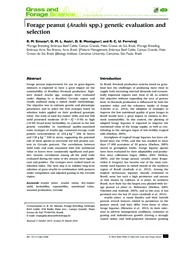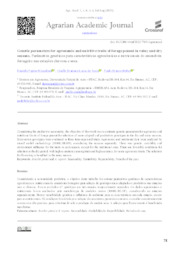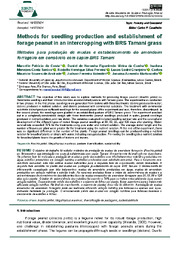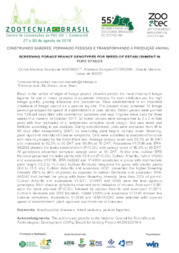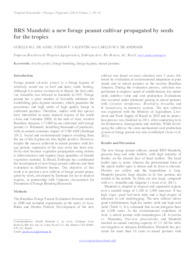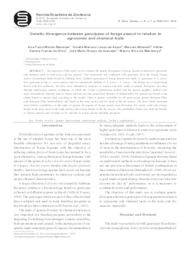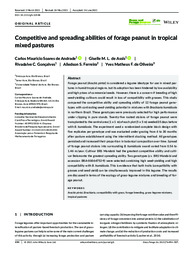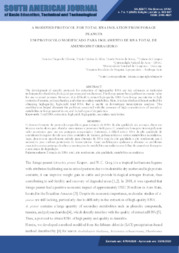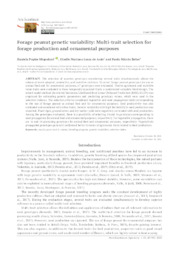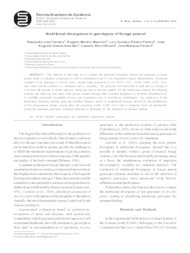Search Publications
Filter by:
| Author(s): RESENDE, R. M. S.; ASSIS, G. M. L. de; MONTAGNER, D. B.; FERREIRA, R. C. U. Forage peanut improvement for use in grass-legume mixtures is expected to have a great impact on the sustainability of Brazilian livestock production. Eighteen cloned Arachis spp. ecotypes were evalua... ... |
| Author(s): MIQUELONI, D. P.; ASSIS, G. M. L. de; BEBER, P. M. Considering the productive seasonality, the objective of this work was to estimate genetic parameters for agronomic and nutritional traits of forage peanut for selection of more adapted and productive... ... |
| Author(s): COSTA, M. P. da; CUNHA, D. de N. F. V. da; TARÔCO, I. M, C.; PEREIRA, R. H. S. The objective of this study was to explore methods for producing forage peanut (Arachis pintoi) cv. Belomonte seedlings and their introduction into an established pasture with Tamani grass |
| Author(s): ANDRADE, C. M. S. de; FERREIRA, A. S.; ASSIS, G. M. L. de Brazil is the center of origin of forage peanut (Arachis pintoi), the most important forage legume for use in mixed pastures in equatorial climates. Its main attributes are the high forage quality, gr... ... |
| Author(s): ASSIS, G. M. L. de; VALENTIM, J. F.; ANDRADE, C. M. S. de Forage peanut (Arachis pintoi) is a forage legume of relatively recent use in beef and dairy cattle feeding. Although it is native exclusively to Brazil, the first culti-var, Amarillo, was released in... ... |
| Author(s): MENEZES, A. P. M. de; ASSIS, G. M. L. de; MATAVELI, M.; SILVA, H. S. F. da; AZEVEDO, J. M. A. de; MENDONÇA, M. S. de The objective of this study was to evaluate the genetic divergence of forage peanut in relation to agronomic and chemical traits in both rainy and dry seasons. This experiment was conducted with genot... ... |
| Author(s): ANDRADE, C. M. S. de; ASSIS, G. M. L. de; GONCALVES, R. C.; FERREIRA, A. S.; OLIVEIRA, Y. M. F. de Forage peanut (Arachis pintoi) is considered a legume ideotype for use in mixed pastures in humid tropical regions, but its adoption has been hindered by low availability and high prices of commercial... ... |
| Author(s): OLIVEIRA, J. C. de; SILVA, C. C. da; SOUZA, A. P. de; CAMPOS, T. de The development of specific protocols for extraction of high-quality RNA are key advances in molecular techniques for elucidating biological processes and mechanisms. The forage peanut has significant... ... |
| Author(s): MIQUELONI, D. P.; ASSIS, G. M. L. de; BEBER, P. M. The selection of superior genotypes considering several traits simultaneously allows the release of more adapted, productive, and nutritive cultivars. To select forage peanut genotypes for use as anim... ... |
| Author(s): Ferreira, A. L.; Maurício, R. M.; PEREIRA, L. G. R.; Azevedo, J. A. G. de; OLIVEIRA, L. S.; Pereira, J. M. Abstract: The objective of this study was to evaluate the nutritional divergence between ten genotypes of forage peanut, based on chemical composition as well as fermentation and in vitro degradation... ... |
Observation
Some of Embrapa's publications are published as ePub files. To read them, use or download one of the following free software options to your computer or mobile device. Android: Google Play Books; IOS: iBooks; Windows and Linux: Calibre.
Access other publications
Access the Agricultural Research Database (BDPA) to consult Embrapa's full library collection and records.
Visit Embrapa Bookstore to purchase books and other publications sold by Embrapa.

